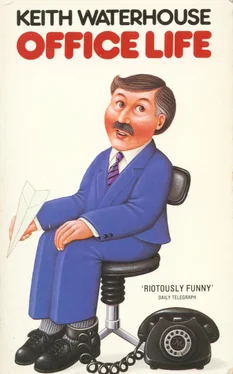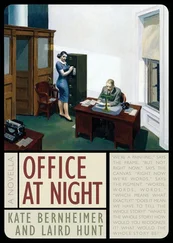If Mrs Rashman was meeting men friends in wine bars, and it did seem to be a man friend by the tone of her voice, then that ruled her out positively. Gryce wondered if Miss Divorce met men friends in wine bars.
It was an outgoing call Mrs Rashman was making, because had she been taking an incoming one he would have heard the telephone ring. It was unlikely to have rung while he was in the lavatory, for she had only commenced to speak as he returned to his desk. 'Oh, hello, it's me,' she had said. She could, of course, have been waiting for her caller to be put on the line by his secretary, but Gryce ruled that possibility out too.
There was a telephone on every desk, and there would be — what? say between sixty and eighty desks on the seventh floor. So between sixty and eighty telephones: but although he had by now been in the office for an hour and a half or so, he had not yet heard one of them ringing.
2
What Gryce had told Seeds about his reasons for leaving his last billet was not substantially the truth. The transport difficulties he had mentioned were real enough, and the comparative proximity of British Albion to London Bridge had certainly influenced him when applying for his new post. But when Seeds had asked, 'What prompted you to transfer your allegiance to Perfidious Albion?' the question had implicitly incorporated another one, 'Why did you leave Comform?' and the fact was that he had been made redundant.
Gryce knew that redundancy was nothing to be ashamed of these days and among his ex-colleagues he had made light of it. 'So. On the scrap heap at forty-one,' he had said mock-bitterly, putting a tragic fist to his forehead in case anyone took him seriously. Then, more soberly, he had added in the relieved tones of one who is glad to be off the treadmill: 'Frankly it couldn't have come at a better time. I've been thinking of making a change for months but I suppose I needed a push.'
'You can't say you haven't got the push now, he said heartlessly,' someone joked.
'Sha!'
Gryce's three fellow-victims, like himself casualties of a rationalization programme, adopted much the same philosophical attitude. 'Look at it this way,' they said. 'Your redundancy pay is capital. Imagine how much you'd have to earn to have that money in the bank, tax paid.' They spoke of not being in too much of a rush to find new jobs, of looking around for a while, perhaps a complete change of vocation. One of them, a man named Parsloe, thought that by selling his house and taking a flat over a shop, he might make a good living selling do-it-yourself materials.
Gryce had no way of knowing whether they felt the same chill in the stomach that he himself was experiencing. But he noticed that one of them was affecting a sudden interest in racing, to give him the excuse of buying the early edition of the evening paper with its columns of situations vacant. 'For Gawd's sake, don't let me put my redundancy money on Red Rum. Hold me back, I beg of you.' The second of the three took to making social telephone calls to friends in other companies, suggesting drinks on the way home from work. Parsloe seemed in earnest about his do-it-yourself project and spent a lot of his time ringing timber merchants and asking about the price of soft woods and dowelling. For himself, Gryce thought of the official unemployment figures and of the stories he had read in the Daily Mail about men of his own age who had been 'shaken out' of their desk jobs and couldn't get further work. He found he was needing to go to the lavatory quite frequently.
He wasn't too worried about the security aspect. With his savings and the lump sum he would get from Comform, he could keep up his present standard of living for twenty months — call it two years with a few economies, or, allowing for inflation, eighteen months to be on the safe side. His wife Peggy earned a few pounds as a part-time cashier in a betting shop, something he didn't broadcast to all and sundry, so there would always be that coming in. Then the little house in Forest Hill had been left to him by his mother, which meant there was no mortgage to worry about, only the rates. He had no hire purchase commitments to speak of, and he didn't have a car to maintain — although that was a mixed blessing, because it would have been something to sell if the money ran short. But surely something would turn up before the money did run short.
It was having nowhere to go between nine and five, even for only a few weeks, that Gryce dreaded. Working in offices, he had come to realize soon after his honeymoon many years ago, was his whole life. He supposed that he must have become institutionalized without knowing it — what prisoners called stir-happy.
He had worked in offices since leaving school at sixteen: first at the Prudential in Holborn where he had stayed for two years; then conscription, when he had been a filing clerk in the RAF Records Office at Gloucester ('Home from home!' he had written in his postcards to All In Small Claims); then the Docks and Inland Waterways where he had met Peggy; then four, no five billets with various commercial companies, and finally — but not finally, as things now turned out — Comform. He supposed that as 'a mere pen-pusher' — that was how he introduced himself to strangers — he ought to have plumped for local government, where you had your security and an index-linked pension. But if he had signed on before the mast in the planning department of Lewisham Town Hall, which he had once been tempted to do, he would have been there for life. Gryce always told himself that he had a gypsy instinct: he liked to change billets every three years or so.
He tended to move on when promotion prospects were in sight. He didn't want to finish up as a departmental manager, he was quite happy as a senior clerk. He liked the routine — not of the work he had to do, which was usually repetitive and always undemanding, but of the office itself. Once he had found his way about and familiarized himself with the stock jokes and catchphrases and the little daily rituals, it was as pleasant a way of passing the days as any he could think of. If he looked forward to his annual holiday, it was only because of the opportunity a few days in Tenerife opened up for Smalltalk. Clicking the button of his Instamatic on a terrace two thousand miles away from home, he could hear himself saying: 'Oh, and this is the German restaurant I was telling you about, where they served twenty-three different kinds of steak, which of course turned out to be steak prepared in twenty-three different ways. That rather blurred figure is either my thumb or Otto, our waiter. What a character he turned out to be.'
If he had taken that billet at Lewisham Town Hall all those years ago he would know every nook and cranny of the building by now. On August the sixteenth he would have been sipping his coffee at a trestle table while a chain-gang of fellow-clerks passed his holiday snaps from hand to hand. As things stood, he had better call in at the travel agent's and recover his deposit.
'Dear Sir,' he pecked out on the office girl's typewriter while she was at lunch, 'I wish to apply for the post of Responsible Investment Clerk advertised in today's Daily Telegraph. I am 41 years of age, with the following experience.' But although he despatched two dozen such letters, he got no replies. Gryce began to develop an unpleasant digestive ailment, which he diagnosed rightly as a symptom of panic. He was not properly qualified for most of the posts advertised: either they wanted skills with computers or other machinery, which he didn't possess, or they were clearly looking for women — Girl Fridays or Personality Plus Girls, as they used to call them — but couldn't say so because of the Sex Discrimination Act. The two dozen jobs he had applied for during a week of combing the classified columns represented not the cream but the full quota of what was available in his particular bracket. This was the first time he had ever changed billets without having the pick of at least a hundred vacancies.
Читать дальше












